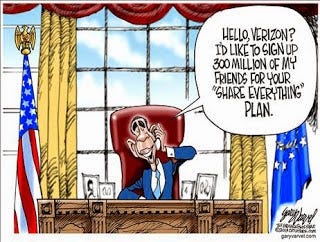DHS run DEA has been secretly spying on billions of phone calls for decades

The U.S. govt. started keeping secret records of Americans' international telephone calls nearly a decade before the Sept. 11 terrorist attacks, harvesting billions of calls in a program that provided a blueprint for the far broader National Security Agency surveillance that followed.
For more than two decades, the Justice Department (DOJ) and the Drug Enforcement Administration (DEA) amassed logs of virtually all telephone calls from the US to as many as 116 countries.
The DOJ revealed in January that the DEA had collected data about calls to "designated foreign countries." But the history and vast scale of that operation have not been disclosed until now.
The DEA also spent millions on spyware & hacking tools to be used on citizens.
Click here & here to read more.
The now-discontinued operation wink, wink was our government's first known effort to gather data on Americans in bulk, sweeping up records of telephone calls made by millions of INNOCENT U.S. citizens.
DOJ spokesman Patrick Rodenbush claims the DEA "is no longer collecting bulk telephony metadata from U.S. service providers." A DEA spokesman declined to comment.
Don't believe them, it's all B.S. need proof? Only a year ago U.S. intelligence Chief Clapper lied to the American public, claiming law enforcement doesn't spy on Americans. Click here & here to read more.
DEA agents gathered billions of phone records without court approval and searched them more often in a day than the NSA does in a year. Then, they automatically linked the numbers the agency gathered to large electronic collections of investigative reports, domestic call records accumulated by its agents and intelligence data from overseas.
Taking a cue from the DEA, police in New York, Florida and across the country are spying on our phones without warrants.
The FBI claims police don't need a warrant to illegally spy on EVERYONE'S phone calls.
Illegal spying on Americans is so bad DHS run police departments are secretly spying on our cell phone calls using Stingray surveillance equipment. Click here & here to read more.
But if police departments are using Stingray surveillance equipment to illegally spy on EVERYONE, it should be public record right? Police departments have found a sneaky way to keep the public from ever knowing about Stingrays and weapons they've acquired. They're instructing surveillance companies to donate to police organizations which effectively keeps them SECRET.
"Across the nation, private foundations are increasingly being tapped to provide police with technology and weaponry that -- were it purchased with public money -- would come under far closer scrutiny."
New York and Los Angeles have the nation's oldest and most generous police foundations, each providing their city police departments with grants totaling about $3 million a year. But similar groups have sprouted up in dozens of jurisdictions, from Atlanta, Georgia, to Oakland, California. In Atlanta, the police foundation has bankrolled the surveillance cameras that now blanket the city, as well as the center where police officers monitor live video feeds.
It's not uncommon for the same companies to be donors to the same police foundations that purchase their products for local police departments. Or for those companies also to be contractors for the same police agencies to which their products are being donated.
The DEA shared the data with the FBI and Customs Service. All of whom work for DHS.
To see a list of the numerous agencies DHS controls click here & here.
It was a model for the NSA's massive phone surveillance system.
More than a dozen current and former law enforcement and intelligence officials described the details of the DOJ's operation on the condition of anonymity because they were not authorized to publicly discuss the intelligence program, part of which remains classified.
The DEA program did not intercept the content of Americans' calls, but the records — which numbers were dialed and when — allowed agents to map suspects' communications and link them to troves of other police and intelligence data.
The drug agency did so with help from military computers and intelligence analysts. Our military installed the supercomputers on the fifth floor of the DEA's headquarters.
That data collection was "one of the most important and effective Federal drug law enforcement initiatives," the DOJ said in a 1998 letter to Sprint asking the telecom giant to turn over its call records. The previously undisclosed letter was signed by the head of the department's Narcotics and Dangerous Drugs Section, Mary Lee Warren, who wrote that the operation had "been approved at the highest levels of Federal law enforcement authority," including then-Attorney General Janet Reno and her deputy, Eric Holder.
It was approved by top DOJ officials in four presidential administrations and detailed in occasional briefings to members of Congress but otherwise had little independent oversight, according to officials involved with running it.
http://www.usatoday.com/story/news/2015/04/07/dea-bulk-telephone-surveillance-operation/70808616/


